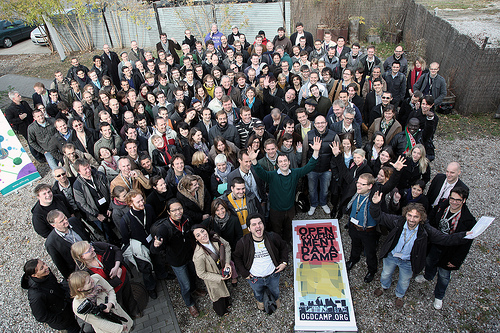
This year’s Open Government Data Camp, hosted by the Open Knowledge Foundation, was held in Warsaw, in the incredible post-industrial Soho Factory. A gathering of open government data enthusiasts from around the world, it was a platform for sharing experiences, tracking progress and debating pressing issues for the future of the movement.
This being my first visit to an event of this kind, I was impressed by the number of attendees – apparently a significant increase on last year – as well as their diversity (although it was disappointing to see no female keynoters). I joined on the second day, which got off to a swift and serious start with keynote presentations.
Andrew Rasiej made a rousing case against ‘E-government’ and in favour of ‘WE-government’. The former implies governments delivering wasteful IT services to citizens, while the latter is about governments opening up their datasets and allowing anyone to build on top of them. Tom Steinberg’s presentation about MySociety was a perfect example of what can be achieved with this approach. Chris Taggart from OpenCorporates set a sober tone by outlining why he believes the open government data movement will probably fail. The majority of the world’s data is held by a relatively small number of companies which show no sign of opening it up, and there are too many open data projects and initiatives which are operating in silos. He concluded that with even with hard work, the odds are still stacked against the movement. Andrew Stott, (UK cabinet office’s Director of Digital Engagement) urged the audience to watch Yes, Minister, the classic British TV comedy set in the corridors of Whitehall, in order understand how ‘they’ think and the barriers to opening up data.
Nigel Shadboldt outlined a number of important developments in open data, and briefly mentioned another issue which is set to grow in importance over the next few years; that of individuals getting access to the data that companies are gathering on them. Personally I see this being manifested in two ways. The first is a government and business-led approach, along the lines of the UK government’s recently announced ‘MyData’ initiative (for which Nigel is an advisor). The idea is that companies will release their customer’s data to individuals, who then give it to third parties, who use it to create services to sell back to the customer – imagine, for instance, an app which tracks your calorie intake by analysing your supermarket purchases. The other is a bottom up, consumer-led approach, the beginnings of which we can already see in the fast-growing ‘Europe against Facebook‘ campaign, which aims to give Facebook users control over the data stored on the social networking site. It will be interesting to see whether and how these two approaches interact in the near future, and how they both relate to the open data movement.
Tom Steinberg explained how his latest project – FixMyTransport – was actually designed to ‘trick people into their first act of civic engagement’. The words ‘activism’ or ‘campaign’ don’t appear on the website, because that kind of language can often be alienating to the target audience, who just want to sort out a problem with their daily commute. The simple interface makes it very easy for a user to make a complaint. One complaint on its own have very little effect, but the site makes it very easy for individual complaints to aggregate publicly. With the support of five or more people, transport operators tend to take notice. The site is a few months old and some early successes suggest the approach could work on a large scale. I really liked the idea of enticing ordinary people with no interest in or knowledge of open data to take part by creating a really simple and attractive interface and purposefully leaving out any political language.
The enigmatically titled ‘Open… ‘ session turned out to be a somewhat philosophical discussion led by Andrew Rasiej and Nigel Shadbolt about the meaning of terms like ‘open’ and ‘public’ when applied to government data. Does data published as a PDF count as public, or does it need to be machine-readable? In a world where more and more of our information-processing is done by machines, ‘public access’ to data which can only be processed via feeble human eyes means very little. Data which has to be scraped from a website is not, Nigel suggested, good enough. Clearly, the ideal would be a presumption that ‘public’ entailed access to the data in formats which allow sophisticated manipulation rather than mere eyeball-scanning.
Generally, there seemed to be surprisingly little discussion of the Open Government Partnership (an intergovernmental initiative to secure commitments to open up government data). When it was mentioned it was often accompanied by scepticism. Although there may be problems with the approach, and it may yet turn out to be another opportunity for governments to enthuse about open data without actually doing much, I wonder if it deserves more optimistic engagement at this stage. That said, there were so many conversations going on in parallel sessions that I may have missed the more positive opinions floating around the camp.
All in all, it was a fascinating snapshot of the current state of the open government data movement. While many challenges lie ahead, the next year is sure to be interesting. I look forward to attending the next event.
